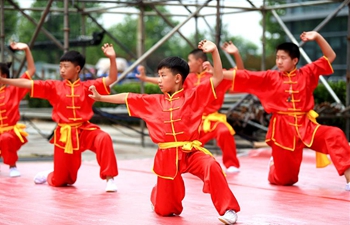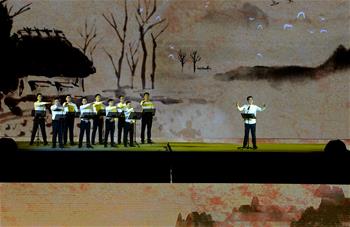by Julia Pierrepont III
LOS ANGELES, June 17 (Xinhua) -- "The best films are not just about unique individuals, they are metaphors for the society and time in which they are made," asserts Xie Fei, one of China's eminent film directors in an exclusive interview with Xinhua here on Saturday.
Earlier last week, he appeared at a packed screening of his award-winning classic "Black Snow" at the University of California, Los Angeles (UCLA), the first stop of his three-city California tour, which includes UCLA, the University of Southern California (USC) and Stanford University.
The screenings of Xie's work included "Black Snow," winner of the coveted Silver Bear Award at the Berlin Film Festival, "A Mongolian Tale," which netted Xie Best Director Awards at the Montreal World Film Festival and the Shanghai Film Festival, and "Song of Tibet," winner of the St. Louis Film Festival, China's prestigious Golden Rooster Special Jury Prize for writing, and the Shanghai Film Critics Award.
The two-day event at UCLA was well-attended and lively discussions ensued on both days, as Xie discussed his films, directing style and his teaching work at Beijing Film Academy.
Now a sliver-haired patrician who began his directing career as one of China's much-lauded "fourth generation" of filmmakers, Xie is best known for the insightful eye that looks beyond his subject's everyday facades to reveal the unvarnished humanity hidden beneath.
His directorial style is introspective, insightful and quietly immersive. He takes viewers on slow, intensely personal journeys into the lives and loves of ordinary people - some lonely and filled with unspoken yearnings and naive hopes as they toil against the relentless confines of their everyday existence and others resonating with the unflagging strength of the human spirit in the face of adversity.
He believes profound films can speak across boundaries of time and space, across political borders, across cultural divides, sharing universal truths about the human condition.
"Every society has a light and dark side. My characters still have hope to better their lives... to find love," he affirmed to Xinhua.
Though a gifted director, Xie is a humble man who considers himself first and foremost a teacher. When not directing his own work, he has spent almost five decades helping shape two generations of Chinese filmmakers at the prestigious Beijing Film Academy, home to some of the finest filmmakers in China, such as Chen Kaige, Tian Zhuangzhuang, Zhang Yimou, and Jia Zhangke.
He is known for creating an environment where students can absorb film culture, explore themselves and flourish.
"Our role is to encourage young filmmakers... to help them find their own voice," he explains. "They come to us with their personalities fully formed, but it is up to us to help them discover their talent."
The Beijing Film Academy's diverse tracks enable aspiring filmmakers to take classes in acting, storytelling, directing, producing, cinematography, and editing to help them discover the path that fulfills them artistically.
Xie gently laments that international trends in filmmaking are skewing toward more commercial, Hollywood-style action movies designed to entertain, not elevate.
"Today, even Chinese films are for entertainment, not art," he said sadly. "But it is through art we learn to aspire and understand others."
He has hopes that art and commercial styles will be combined more often, "so that the artistic sensibilities can be passed down to the next generation."
His commitment has extended to funding the projects of some of his students' films out of his own pocket and helping to fund a new graduate program at the Beijing Film Academy - both efforts to ensure that talented students who have not yet gotten a chance to realize their dreams might have the opportunity to prove themselves and gain a place in the industry.
With a strong belief in the power of art to edify the viewer, Xie has high hopes for the future of filmmakers and film culture everywhere.
"Culture is evolving. It used to be that humanity expressed itself and recorded history and life in written form," he told Xinhua. "Now, with the coming of the digital camera and era, everyone can express themselves visually."

















